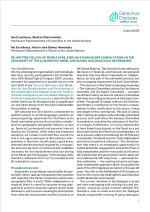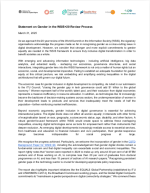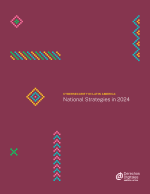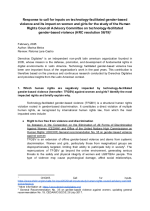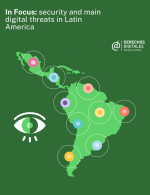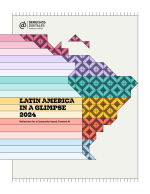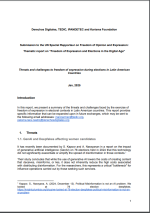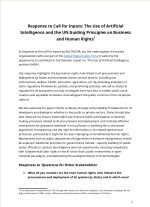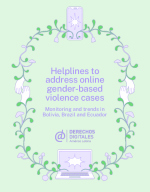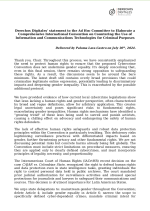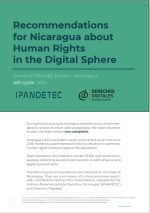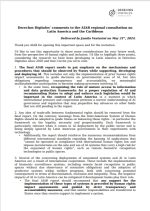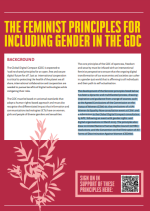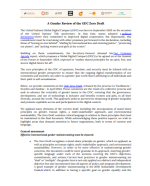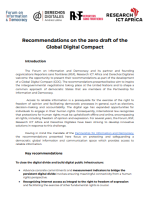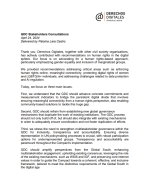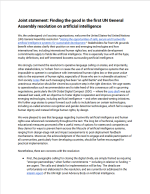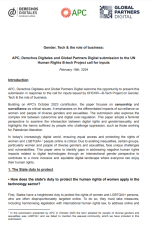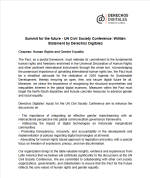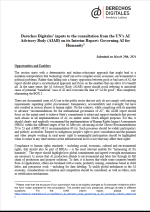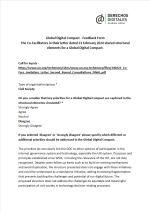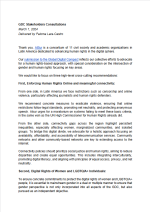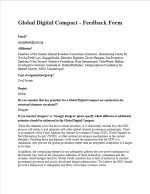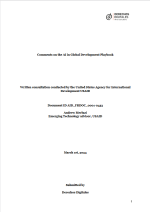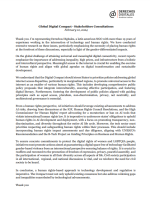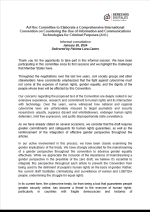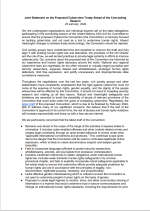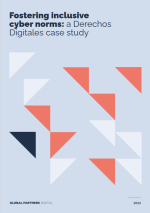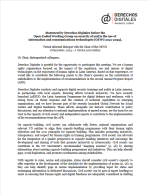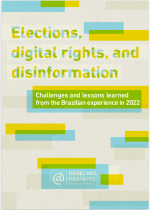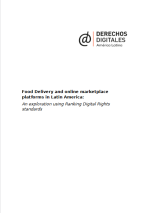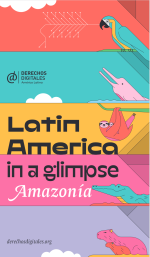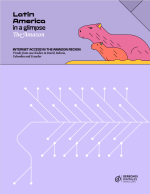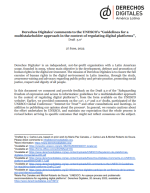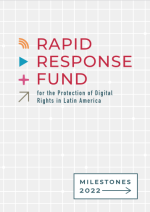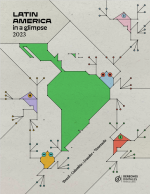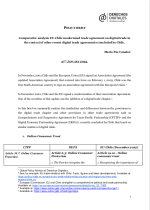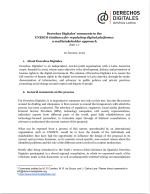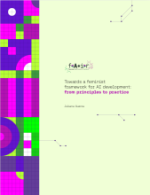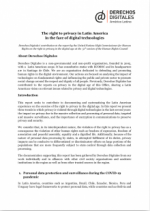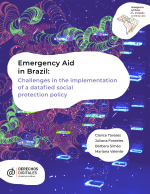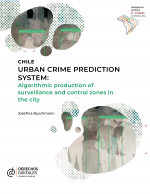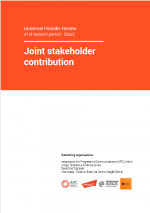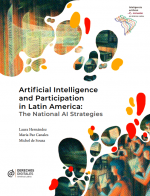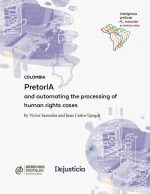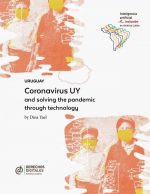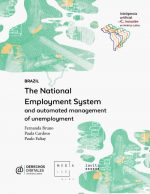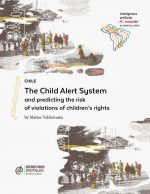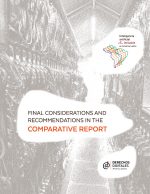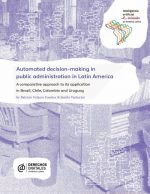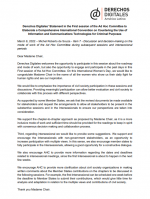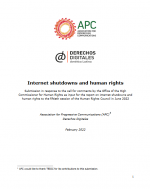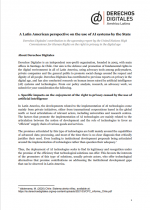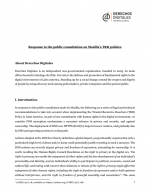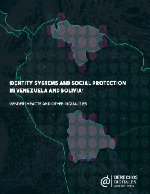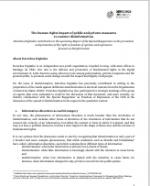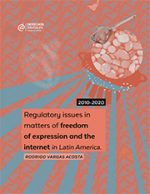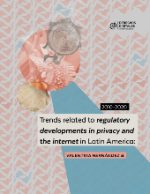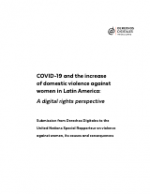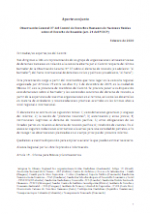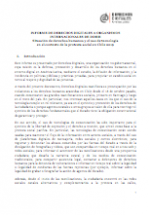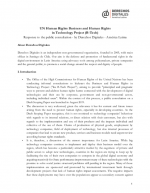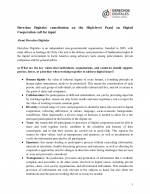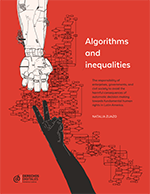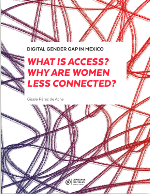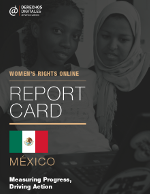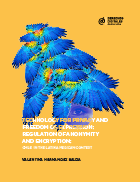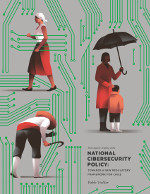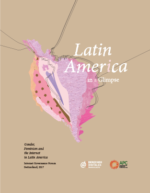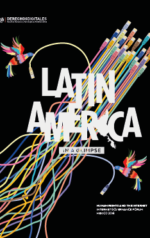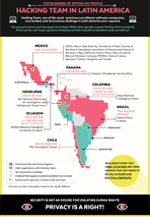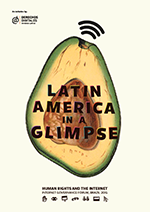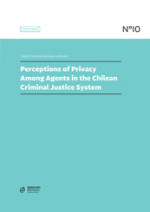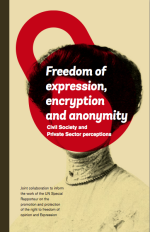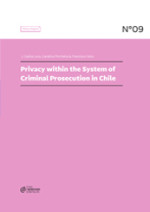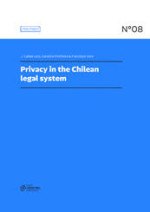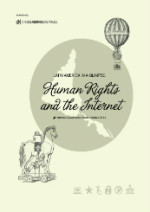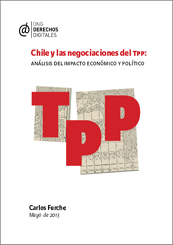Publicaciones
Joint Comments on the draft policy on cyber-enabled crimes under the Rome Statute
Este documento es un aporte suscrito con la Electronic Frontier Foundation en respuesta a la convocatoria a comentarios hecha por la Fiscalía de la Corte Penal Internacional sobre un borrador de documento de políticas públicas donde se aborda la persecución de crímenes del Estatuto de Roma facilitados por medios cibernéticos, en especial, por internet, y su persecución alineada con estándares de derechos humanos.
Joint Comments for applying a gender lens to the implementation of the UNGPs in the digital age
En el marco de su participación en la Coalición de Género, Derechos Digitales contribuyó con aportes clave para la elaboración de un informe dentro del proyecto B-TECH. Dicho informe aborda la integración de la perspectiva de género e interseccional en la aplicación de los “Principios Rectores sobre las empresas y los derechos humanos: puesta en práctica del marco de las Naciones Unidas para ‘proteger, respetar y remediar'”.
Response to call for inputs for the thematic report on “artificial intelligence and judicial systems”
En el marco de la convocatoria de la Relatoría sobre la independencia de los jueces y los abogados sobre “inteligencia artificial y la justicia”, enviamos una contribución enfocada en los casos de uso de sistemas de IA en los poderes judiciales de la región, exploramos la experiencia regulatoria de países como Colombia y Brasil y sugerimos recomendaciones para la alineación del uso de la IA en la justicia con los derechos humanos.
Joint Letter on the AI Scientific Panel and the Global Dialogue
Joint letter from several civil society organizations and individuals, presenting detailed suggestions and recommendations for follow-up to the UN Stakeholder Consultation of April 2, 2025 regarding the formation of the AI Scientific Panel and the Global Dialogue.
Statement on Gender in the WSIS+20 Review Process
Joint statement of the Gender Coalition – of which Derechos Digitales is a member – presenting detailed suggestions and recommendations regarding the need to consider gender aspects in the WSIS20 review process.
Cybersecurity in Latin America: National strategies in 2024
This report discusses the national cybersecurity policies and strategies in Latin America, identifying common points and ongoing challenges in their implementation. The document highlights the diversity of approaches within the region and emphasizes the urgency to enhance international collaboration, strengthen local capacities, and align national strategies with international standards.
Response to call for inputs on technology-facilitated gender-based violence and its impact on women and girls for the study of the OHCHR
This is a contribution to the call for inputs for the study of the Human Rights Council Advisory Committee on technology-facilitated gender-based violence. We present considerations on the topic based on our work, discussing TFGBV in Latin America.
In Focus: security and main digital threats in Latin America
The report “En la Mira” was led by Derechos Digitales and developed by the Latin American Observatory of Digital Threats (OLAD). These 14 organizations attended 411 cases in Latin America on cyber-attacks, digital gender violence, censorship, espionage and mass surveillance that are analyzed in the report.
Latin America in a Glimpse: Reflections for a Community-based, Feminist AI
A report by Derechos Digitales that explores how AI can adapt to the needs and cultural contexts of Latin America, rather than imposing extractivist and colonial models. Through conversations with researchers, technologists, and activists from various countries in the region, we analyze critical approaches and methodologies that respond to three themes: education, territory, and gender.
Threats and challenges to freedom of expression during elections in Latin American Countries
Esta es una contribución conjunta para responder al llamado hecho por la Relatoría Especial para la Libertad de Expresión de la ONU sobre “Libertad de expresión y elecciones en la era digital”, en donde enfocamos la atención en los retos y riegos que enfrenta América Latina en el tema. El aporte se encuentra suscrito por TEDIC, IPANDETEC y Fundación Karisma.
Response to Call for Inputs: The Use of Artificial Intelligence and the UN Guiding Principles on Business and Human Rights
Este documento es un aporte conjunto al llamado a contribuciones hecho por el Grupo de Trabajo en Empresas y Derechos Humanos de la ONU que estuvo enfocado en “El uso de la inteligencia artificial y los Principios Rectores sobre las Empresas y Derechos Humanos”. El documento está suscrito también por IT4C, Latin American Campaign for the Right to Education (CLADE), Article 19 Mexico, Research ICT Africa, el Transnational Institute, y el Development Alternatives with Women for a New Era (DAWN).
Helplines to address online gender-based violence cases Monitoring and trends in Bolivia, Brazil, and Ecuador
This report details the operations of three digital security helplines in Latin America: the S.O.S Digital Center of Fundación InternetBolivia.org in Bolivia, Maria d’Ajuda of Marialab in Brazil, and Navegando Libres por la Red of Taller Comunicación Mujer in Ecuador.ONE PAGER CONNECTIVITY IN THE AMAZON: Recommendations to combat the digital divide
Derechos Digitales presents a concise summary of the report developed in collaboration with Fundación Internet Bolivia (Bolivia), Instituto de Defensa de Consumidores (Brazil), Dejusticia (Colombia), and Fundamedios (Ecuador). This document outlines key recommendations aimed at closing the digital divide in the Amazon region.
CONNECTIVITY IN THE AMAZON: Recommendations to combat the digital divide
Derechos Digitales, in collaboration with Fundación Internet Bolivia (Bolivia), Instituto de Defensa de Consumidores (Brasil), Dejusticia (Colombia), and Fundamedios (Ecuador), has been exploring the realities of the Amazon region in various countries since 2023. This diagnosis, combined with a process of participatory workshops with Indigenous and rural communities, has generated a set of recommendations to close the digital divide in the Amazon.Summary: Recomendations for Bolivia on human rights in digital environments
The following recommendations are addressed to the State of Bolivia. They are a summary of the more extensive report with contributions sent to the United Nations by Fundación Internet Bolivia and Derechos Digitales.
Derechos Digitales’ statement to the Ad Hoc Committee to Elaborate a Comprehensive International Convention on Countering the Use of Information and Communications Technologies for Criminal Purposes
Delivered by Paloma Lara-Castro on July 30 th , 2024.
Recommendations for Nicaragua about Human Rights in the Digital Sphere
The following recommendations are directed at the State of Nicaragua. They are a summary of a more extensive report
with contributions sent to the United Nations, prepared by the Instituto Panamericano de Derecho y Tecnología (IPANDETEC) and Derechos Digitales.Derechos Digitales’ comments to the AIAB regional consultation on Latin America and the Caribbean
Delivered by Jamila Venturini on May 21st, 2024.
The Feminist Principles for Including Gender in the GDC (September, 2023)
The development of the feminist principles listed here has been a dynamic and multifaceted process, drawing inspiration and guidance from a range of sources, such as the Agreed Conclusions of the Commission on the Status of Women (CSW) 67; the conclusions of a UN Women & Equality Now consultation event at CSW; and a submission to the Global Digital Compact consultation by APC, following an event with gender rights and digital organisations in March 2023. The principles also draw on United Nations Human Rights Council (A/HRC) resolutions, and the Convention on the Elimination of All Forms of Discrimination Against Women (CEDAW).
A Gender Review of the GDC Zero Draft
Here we provide comments on the GDC Zero Draft, released by the process Co-Facilitators—
Sweden and Zambia— in April 2024. These comments are the result of a collective process and
seek to advance the centrality of gender issues in the GDC, ensuring that the governance,
development, and use of technology is inclusive and benefits women and girls, in all their
diversity, around the world. This approach seeks to prevent the deepening of gender inequality
and promote equitable access and participation in the digital context.Recommendations on the zero draft of the Global Digital Compact (April 26, 2024)
The recommendations presented here aim to inspire the intergovernmental negotiations taking place at the United Nations and to shape a common approach of democratic States that are members of the Partnership for Information and Democracy.
GDC Stakeholders Consultations (April 24, 2024)
Derechos Digitales’ submission to the GDC. GDC should amplify perspectives from the Global South, enhancing multistakeholder engagement, upholding existing consensus, leveraging the role of the existing mechanisms
Joint statement: Finding the good in the first UN General Assembly resolution on artificial intelligence
We, the undersigned civil society organizations, welcome the United States-led United Nations
(UN) General Assembly resolution “Seizing the opportunities of safe, secure and trustworthy
artificial intelligence systems for sustainable development.”APC, Derechos Digitales and Global Partners Digital submission to the UN Human Rights B-tech Project call for inputs (February 15, 2024)
APC, Derechos Digitales and Global Partners Digital welcome the opportunity to present this submission in response to the call for inputs issued by OHCHR—B-Tech Project on Gender, Tech & the role of business.
Summit for the future – UN Civil Society Conference: Written Statement by Derechos Digitales
Derechos Digitales’ inputs to the consultation from the UN’s AI Advisory Body (AIAB) on its Interim Report: Governing AI for Humanity
Derechos Digitales’ Feedback form of the structural elements for a Global Digital Compact (8 march 2024)
We disagree that the key priorities for the GDC are contemplated in the structural elements circulated by the Co-Facilitators in their letter dated 23 February 2024. The priorities do not clearly link the GDC to other spheres of participation in the internet governance system and technology, especially the UN system. Processes and principles established since WSIS, including the relevance of the IGF, are not duly recognized.
GDC Stakeholders Consultations (March 1, 2024)
AlSur is a consortium of 11 civil society and academic organizations in Latin America dedicated to advancing human rights in the digital sphere. Our submission to the Global Digital Compact reflects our collective efforts to advocate for a human rights-based approach, with special consideration on the intersection of gender and human rights focusing on key areas.
Global Digital Compact – Joint Feedback to the GDC Structure (8 March 2024)
Suggestions by Civil Society about GDC, asking that is structurally unclear how the GDC process will relate to and integrate with other global internet governance mechanisms.
Signed by members of the Greater Internet Freedom Consortium (Internews, International Center for Not-for-Profit Law, EngageMedia, Derechos Digitales, Droits Humains San Frontières, Zambian Cyber Security Initiative Foundation, Rudi International, Tech4Peace, Balkan Investigative Network, InternetLab, DefendDefenders, Metamorphosis Foundation for Internet Society, MISA Mozambique)
Written consultation conducted by the United States Agency for International Development USAID
“Opportunities, risks and barriers of Artificial Intelligence” from the Global South.
Statement by Derechos Digitales at Global Digital Compact’ Stakeholders Consultations
Ad Hoc Committee to Elaborate a Comprehensive International Convention on Countering the Use of Information and Communications Technologies for Criminal Purposes (AHC)
Joint Statement on the Proposed Cybercrime Treaty Ahead of the Concluding Session
Joint Statement on the Proposed Cybercrime Treaty Ahead of the Concluding SessionCivil society groups have contributed time and expertise to improve the draft and fully
align it with existing human rights law and standards, the principles of the UN Charter
and the rule of law, as well as best practices to provide legal certainty in efforts to improve
cybersecurity.Fostering inclusive cyber norms: a Derechos Digitales case study
How would international cyber norms be implemented substantively? How different would participation be in comparison to the previous process, and how would gender and human rights considerations be advanced in the new draft?
Statement by Derechos Digitales before the Open-Ended Working Group on security of and in the use of information and communications technologies (OEWG 2021-2025)
Virtual informal dialogue with the Chair of the OEWG
Elections, digital rights, and disinformation: challenges and lessons learned from the brazilian experience in 2022
The publication analyzes the specificities of the disinformation ecosystem in the last presidential elections in Brazil, seeking to offer recommendations for other countries in the region facing this problem. The study was conducted by the Brazilian researcher and professor, Anna Bentes, as part of an internship in Digital Rights between November 2022 and May 2023.
Food Delivery and online marketplace platforms in Latin America: An exploration using Ranking Digital Rights standards
While platform labor has been a topic of concern for workers, academia, civil society, and governments ever since Uber started to aggressively expand its services globally, with attention only increasing over the past decade, the Covid-19 years have highlighted the need for a systematic examination of how online marketplaces and food delivery platforms, specifically, operate, in what ways they may impact the lives of users interacting with them, as well as their level of commitment with basic human rights.
Poster: Latin América in a Glimpse – Amazonia
Latin America in a Glimpse The Amazon
INTERNET ACCESS IN THE AMAZON REGION
Trends from case Sudies in Brazil, Bolivia,
Colombia and EcuadorDerechos Digitales’ comments to the UNESCO’s “Guidelines for a multistakeholder approach in the context of regulating digital platforms” – Draft 3.0
Rapid Response Found – Milestones 2022
In 2022, the Rapid Response Found for the Protection of Digital Rights in Latin America (RRF) celebrated three years of work. Managed by Derechos Digitales, the RRF was coceivedas a contextualized, agile, flexible and less bureaucratic to the needs of organizations and activists working in Latinamerica when facing urgent situations that cannot be adressed by regular cycles.
LATIN AMERICA in a glimpse 2023
A peek at the gaps shaping our
experiences on the internetComparative analysis EU-Chile modernized trade agreement on digital trade in the context of other recent digital trade agreements concluded by Chile.
Derechos Digitales’ comments to the UNESCO Guidance for regulating digital platforms: a multistakeholder approach draft 1.1 1
Rapid Response Fund – 2021 Milestones
The Rapid Response Fund for the Protection of Digital Rights in Latin America (RRF) arises with the objective of responding in an agile manner to the requirements of Latin American activists, social movements and civil society organizations working at the intersection between human rights and technologies, especially in situations of extreme urgency that cannot be effectively addressed by the regular cycle of project funding.
Towards a feminist framework for AI development: from principles to practice
Is it possible to develop AI that does not reproduce logics of oppression? To answer this question, we focus on the power relations immersed in the field of AI and make an interpretative analysis of the day-to-day experiences of seven women working in some field of AI or data science in the region, in dialogue with different statements of feminist principles and guidelines for the development and deployment of digital technologies.
The right to privacy in Latin America in the face of digital technologies
Derechos Digitales’ contribution to the report by the United Nations High Commissioner for Human
Rights on the right to privacy in the digital age at the 51 th session of the Human Rights CouncilBudapest Convention on Cybercrime in Latin America: A brief analysis of adherence and implementation in Argentina, Brazil, Chile, Colombia and Mexico.
This report aims to discuss some of the main points of the Convention, as well as the challenges of implementation and harmonization of the provisions of the text with the legal systems and legal frameworks of the countries of the latin American region.
Emergency Aid in Brazil: Challenges in the implementation of a datafied social protection policy
Urban Crime Prediction System: Algorithmic production of surveillance and control zones in the city
Joint Stakeholder Contribution Universal Periodic Review 41st Session Period – Brazil
This submission focuses on Brazil’s fulfilment of human rights obligations in the digital context and seeks to strengthen recommendations focused on guaranteeing universal access to the Internet in order to make possible free expression and association; access to information, knowledge and culture; and the exercise of economic and social rights in a manner that is secure, respectful of privacy and autonomy, and free of any kind of discrimination.
Artificial Intelligence and Participation in Latin America: The National AI Strategies
PretorIA and automating the processing of human rights cases in Colombia
Coronavirus UY and solving the pandemic through technology in Uruguay
The National Employment System and automated management of unemployment in Brazil
The Child Alert System and predicting the risk of violations of children’s rights in Chile
Final considerations and comparative report
Executive summary of “Automated decision-making in public administration in Latin America. A comparative approach to its application in Brazil, Chile, Colombia and Uruguay”.
Automated decision-making in public administration in Latin America. A comparative approach to its application in Brazil, Chile, Colombia and Uruguay.
Derechos Digitales’ Statement in the First session of the Ad Hoc Committee to Elaborate a Comprehensive International Convention on Countering the Use of Information and Communications Technologies for Criminal Purposes
8 de marzo de 2022
Internet shutdowns and human rights
Submission in response to the call for comments by the Office of the High Commissioner for Human Rights as input for the report on internet shutdowns
and human rights to the fiftieth session of the Human Rights Council in June 2022.A Latin American perspective on the use of AI systems by the State Derechos Digitales’ contribution to the upcoming report by the United Nations High Commissioner for Human Rights on the right to privacy in the digital age
Response to the public consultation on Mozilla’s TRR policies (2021)
Identity systems and social protection in Venezuela and Bolivia: gender impacts and other inequalities
Research about the implementation of digital systems to control people’s access to social protection programs in Venezuela and Bolivia.
The human rights impact of public and private measures to counter disinformation (2021)
Rapid Response Fund: Milestones 2019-2020
Relevant information about the Rapid Response Fund for the Protection of Digital Rights in Latin America and its main milestones during the first 18 months of operation, from July 2019 to December 2020.
Regulatory issues in matters of freedom of expression and the internet in Latin America
Analysis of the changes in legislative and jurisprudential matters with respect to a series of significant issues: the right to honor, intellectual property, responsibility of intermediaries, the right to be forgotten and the responsibility of search engine providers, internet neutrality, hate speech and other direct or indirect forms of censorship.
Trends related to regulatory developments in privacy and the internet in Latin America
Analysis of the changes in legislative and jurisprudential matters with respect to a series of significant issues: data protection, surveillance and intelligence activity, encryption, crimes against intimacy, telephone identity record mandates, rules on the retention of communication data, and rules on biometrics.
It’s Not Magic: Interfaces and Protocols for Video Calls
Through the WebRTC standard, this publication analizes how videocalls are technicaly possible, and what depends on being able to use this service optimally in a region like Latin America and the Caribbean.
A tech-optimistic heresy flourish during the pandemic
A critical review to the different roles assumed by technology on the fight against the COVID-19 pandemic, from a human rights perspective, and an emphasis on Latin America
COVID-19 and the increase of domestic violence against women in Latin America: A digital rights perspective (2020)
What Do We Talk When We Talk About AI: Algorithmic Decision-Making in Latin America (2020)
A a brief look at the implementation of algorithmic decision-making systems in Latin America and its impact on human rights, as part of our 2019 Latin America in a Glimpse series.
Joint Submission CG 37 – Participants in the American Regional Consultation
Human rights situation and the use of technology during social protests in Chile 2019
UN Human Rights Business and Human Rights in Technology Project (B-Tech) Consultation (2019)
UN High-level Panel on Digital Cooperation Consultation (2019)
Latin America in a Glimpse: Algorithms and Inequalities (2018)
A preview of the 2018 edition of Latin America in a Glimpse, about the impact of algorithmic decisions in Latin American democracy.
What is Access? Why are Women Less Connected? (2018)
Digital Gender Gap in Mexico
Report Card. Women’s rights online (2018)
Measuring Progress, Driving Action. Gender audit prepared in partnership with the Web Foundation.
Data Retention and Registration of Mobile Phones: Chile in the Latin American Context (2017)
A compared perspective about data retention and registration of mobile phones laws fromf Mexico, Brazil, Colombia, Peru, Argentina and Chile.
Technologies for Privacy and Freedom of Expression: Rules on Anonymity and Encription (2017)
Chile in the Latin American context
The Protection of Personal data in Chile (2017)
This report portraits the current state of protection of personal data in Chile, from multiple perspectives: normative, institutional and political.
National Cibersecurity Policy
Participatory drafting of the National Cibersecurity Policy. Towards a new regularoty framework for Chile
Latin America in a Glimpse (2017)
Gender, feminism and the internet in Latin America
Latin America in a Glimpse (2016)
A summary of the most relevant events with respect to human rights and tecnology in Latin America in 2016.
Hacking Team in Latin America: The business of spying on people
Did your government purchased spying technology? Which state agencies acquired Hacking Team’s products? What was the cost? Is your government keeping activsts and political dissidents under surveillance?
Latin America in a Glimpse (2015)
A summary of the most relevant events with respect to human rights and the internet in Latin America in 2015Perceptions of privacy among agents in the Chilean criminal justice system (2015)
This investigation examines varying perceptions of the concept of privacy and the practical implications of these perceptions among the main actors in the Chilean criminal justice system.
Freedom of expression, encryption, and anonymity (2015)
Collaborative research on the use of encryption and anonymity in digital communications. The main goal of this initiative was to collect cases to highlight regional peculiarities from Latin America and other few countries from the Global South.
Privacy within the System of Criminal Prosecution in Chile (2014)
In the following pages we will develop a study on the problems of privacy the fight against crime in Chile poses. To do that three main aspects must be analyzed: the legal framework, the strategic plan of the Public Ministry and the level of legal privacy protection in the country.
Privacy in the Chilean legal system (2014)
The present report constitutes the result of an examination of the legal regulations currently valid in Chile and linked to a set of interests related, namely: private life, intimacy, and the inviolability of private communications and the protection of personal data.
Latin America in a glimpse: human rights and the Internet (2014)
A summary of some aspects in the discussion in Latin America regarding human rights and the internet. This initiative has been especially made to increase the understanding of the region in the international community gathered at the IGF 2014.
Chile and the TPP negotiations: analysis of economic and political impact (2013)
Analysis of the costs and benefits it has for the Chilean participation in the Trans-Pacific Partnership Agreement prepared by Mr. Carlos Furche as an independent consultant .



